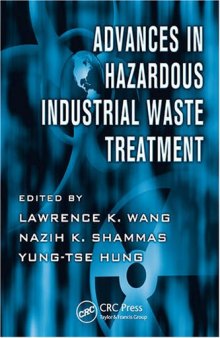 جزییات کتاب
جزییات کتاب
As the global nature of pollution becomes increasingly obvious, successful hazardous waste treatment programs must take a total environmental control approach that encompasses all areas of pollution control. With its focus on new developments in innovative and alternative environmental technology, design criteria, effluent standards, managerial decision methodology, and regional and global environmental conservation, Advance in Hazardous Industrial Waste Treatment provides the widest possible coverage drawn from the full spectrum of experts in the field The volume covers environmental pollution sources, waste characteristics, control technologies, management strategies, facility innovations, process alternatives, costs, case histories, and effluent standards in industry. It delineates methods, technologies, and the regional and global effects of important pollution control practices. Chapters highlight innovative and alternative technologies, design criteria, managerial decision making, and regional and global environmental conservation specific to industrial hazardous wastes. They feature examples of major industrial hazardous pollutants that have significant effects on the environment, as well as extensive bibliographies for each industrial waste treatment practice that point to sources of further information. Since the field of industrial hazardous waste treatment is very broad, no one can claim to be an expert in all industries. Therefore, editors Wang, Shammas, and Hung draw on collective contributions that reflect the depth and breadth of the field, making the resulting handbook the best available reference on chemical and environmental engineering for industrial hazardous waste treatment. They provide technical and economical information on the development of the most feasible total environmental control programs that can benefit industries and local municipalities.



 دانلود کتاب
دانلود کتاب

 جزییات کتاب
جزییات کتاب





 این کتاب رو مطالعه کردید؟ نظر شما چیست؟
این کتاب رو مطالعه کردید؟ نظر شما چیست؟
